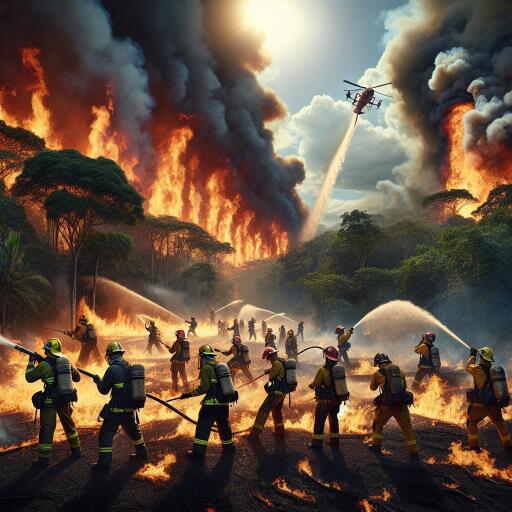
Brazilian Firefighters Confront Early Amazon Wildfires Amid Severe Drought
In the sprawling expanses of the Brazilian Amazon, firefighters are currently facing one of the most challenging early fire seasons in two decades. A combination of an unprecedented drought, increasingly aggravated by global warming, has laid the groundwork for wildfires that have erupted with ferocity.
Near the Transamazonian Highway, in Apui located within the southern regions of Amazonas state, a thick haze fills the air. Fire brigades, drawn from distances as far as 600 kilometers, have converged here to tackle the raging fires that have arrived earlier and with more intensity than usual.
Decked out in vibrant yellow gear, brigades work tirelessly into the night, employing a mixture of back-mounted water sprayers and leaf blowers to combat the flames. These fires, indiscriminate in their path, have consumed vast tracts of both forests and pastures, leaving behind a scorched landscape.
The challenge of these wildfires presents a significant test for President Luiz Inacio Lula da Silva, who has committed Brazil to a path of robust environmental protection. This commitment is particularly under scrutiny as Brazil prepares to host the United Nations COP30 climate summit next year.
Many of the fires originate in areas where the jungle is being cleared for cattle ranching. The combination of dry conditions over the last year has facilitated the spread of fire into the rainforest, an ecosystem that generally resists burning in its natural, moist condition.
Local firefighting brigades, such as the government’s Prevfogo unit led by Domingos da Silva Araujo in Apui, have noticed a concerning trend. “The climate shift towards drier and warmer conditions each year allows the fires to penetrate deeper into untouched forest areas,” Araujo explained. The region is currently a virtual tinderbox, having not seen rain for over a month.
Recent satellite data from Brazil’s National Institute for Space Research (INPE) highlight the scale of the issue. By the first seven months of 2024, the area burnt in the Amazon drastically increased compared to the previous year, marking the most significant fire damage since 2004. Over 26,246 square kilometers were affected, an area larger than the US state of Maryland or comparable to the size of Rwanda.
The situation is likely to deteriorate further, as the peak fire months of August and September loom, traditionally followed by the onset of seasonal rains. However, last year’s delayed and weaker rainfall—attributed to an El Niño weather pattern intensified by climate change—has left the rainforest more susceptible to fires this year.
Similarly, these climatic variables have already propelled wildfires in Brazil’s Pantanal wetlands to unprecedented levels in June, as per INPE reports. In response, President Lula has activated an emergency government task force to mitigate damage in that region.
Despite earlier successes in curtailing illegal deforestation, President Lula’s administration now grapples with a more daunting challenge: stopping the Amazon fires. A recent study suggests that fires may release more carbon dioxide in the region, exacerbating the global warming crisis. As Lula strives to uphold Brazil’s environmental promises, the battle against deforestation and climate change continues.





Leave a Reply